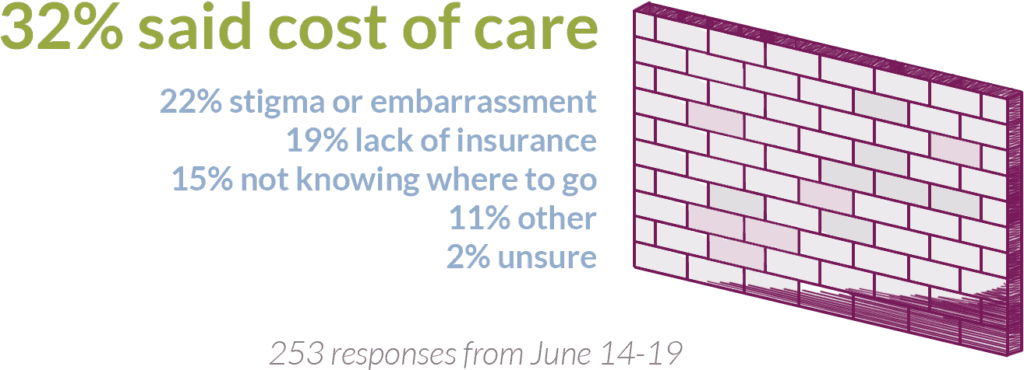Earlier this month, the world was shaken by the deaths of Kate Spade and Anthony Bourdain. The two talented and prominent figures had both committed suicide, stunning the public and pushing mental health into the headlines.
With this topic in mind, Reach NC Voices wanted to hear from North Carolinians about their thoughts on mental health access in the state, so in our June 14 Reach Roundup newsletter we posed our Question of the Week: “What do you think is the biggest barrier to seeking mental health care?”
Response options included: lack of insurance, the cost of care, not knowing where to go for care, stigma or embarrassment, unsure, or other. Here’s the breakdown of how participants answered our question and some of the comments we received:


“I think there are fewer places to receive mental health care and the cost is probably prohibitive. I have a friend who works in an emergency room in NC and she says they serve as a mental health pharmacy. Patients get in trouble or in desperate need and go to the emergency room for medication etc. They are not receiving consistent care, but only getting it when their situation is dire. In school, we simply do not have the resources. I had several students with mental health issues this year but there was no one in the school who could support us or offer therapy to the students.”
-Kim from Wake County
“Many people believe they can handle everything on their own or should be able to handle everything on their own. Family members tell you that you just need to deal with things.”
-Respondent from Winston-Salem, NC
“There is definitely a stigma and certain amount of denial attached to recognition and addressing our own mental health. This is why we need to work on increasing the normality of mental health care for ALL. Everyone needs someone to talk to; once you begin speaking, you are suddenly not alone. Mental health wellness physicals need to be a free annual service, just like physical wellness annual visits, with follow up provided as needed. We are a long way from admitting this.”
-Rachel from Cherokee County
“Calling a provider [and] not knowing what services they have available. Having to wait to get return calls. Missing calls for appointments. Some providers have poorly run office systems.”
-Respondent from Rocky Mount, NC
“Feeling diminished in the eyes of another person if I reveal my mental struggle.”
-Respondent from Winston-Salem, NC
Interested in participating in Reach NC Voices? You can sign up below to share your thoughts on our weekly questions. We’d love to hear from you!


